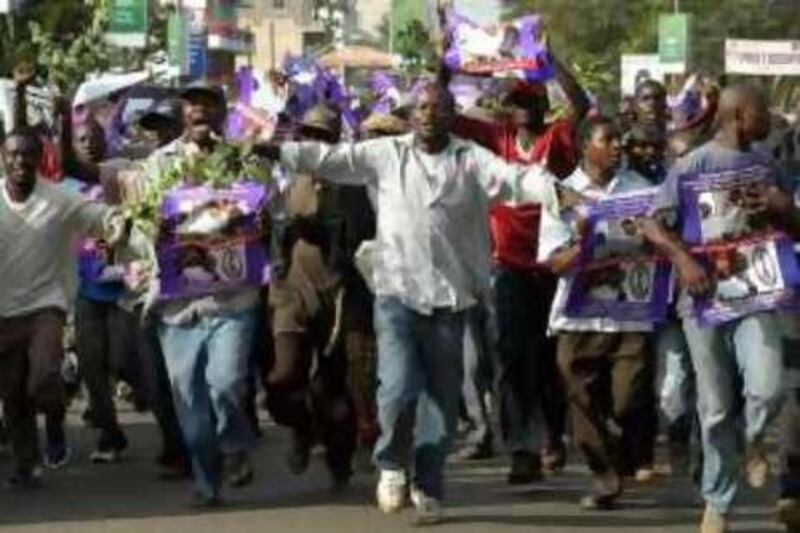KOGELO, KENYA // In his victory speech, Barack Obama spoke of a 106-year-old woman, Ann Nixon Cooper, born within a generation of slavery, when blacks were excluded from the democratic process, who had lived to cast her vote for the US's first African-American president. Mr Obama's ascension to the presidency is an extraordinary expression of the American dream, and a fundamental change in the importance of race in a country still dealing with the legacies of deep divisions over skin colour. It is a message that resonates across Africa. Kgalema Motlanthe, the new South African president, told him in a letter yesterday: "Your election to this high office of the American people carries with it hope for millions of your countrymen and women as much as it is for millions of people particularly of African descent, both in the continent of Africa as well as those in the Diaspora." But it sounds loudest in Kogelo, a small village of subsistence farmers in the rolling hills of western Kenya, where his father and namesake grew up. Malik Obama, the president-elect's stepbrother, said: "It's fantastic. This is groundbreaking. It opens up everything, it brings us together and seems like it's an act of God." Residents of the area - who have developed an extensive knowledge of American politics in recent months - had feared the Bradley Effect, a phenomenon in which black politicians' opinion poll figures exaggerate their support because racially motivated voters hide their true intentions when surveyed. "There's opinion and there's the time people are in the box, it's different," Olita Ogonjo, 38, a social researcher, said as polling opened. "I hope not, I pray not and I want to underline the word pray." He wondered how the world would look at America if this happened. But the final outcome, he said, "will really have a lot of meaning for a lot of people in the world". George Omondi, 42, from Kogelo, who works as a clinical officer in Kisumu, sat under a marquee in the grounds of the village dispensary, tallying the results as they came in through the early hours of a cold African night. "It's great because we believe that there is racism," he said. "We are living in the 21st century but most African elections are decided on tribes. It's not racism but we decided our elections on tribes and which part of the country you come from. We had it in mind that this could also be used to decide the US elections. "It proves us wrong. This will prove to the whole world that elections are on policies and not a colour bar." A former MP for the area, Samuel Weya, went much further, proclaiming that the United States had now secured itself an unprecedented moral authority that it should use to the full in Africa. "It's highly significant, it's a clear change in the perspective of the world and a lot of inspiration for black people," he said. "It's a good gesture on behalf of the whites to vote for somebody of that nature, it shows a bond between the two societies." It was a "huge change, a step change" in the importance of race as an issue. When he entered the Kenyan parliament in 2002 - before Mr Obama's stunning, defining speech to the Democratic convention in 2004 - the idea of a black American president was a dream never even imagined, "not in our lifetimes". "Even an African can be given a huge responsibility now and accept it," he said. "For many nations of the world the perception has changed." Across Africa, the mindsets of the political elites are rooted in the struggle against colonialism. In a few cases, such as Omar Bongo of Gabon and Robert Mugabe of Zimbabwe, the independence leaders are still in power, using their historical roles to demand a right to remain in office. In many countries the independence parties retain an iron grip on power, having transformed themselves into self-perpetuating networks that do their utmost to eliminate the risk of democratic change. And throughout the continent, external influence on internal affairs is an affront, epitomised by Thabo Mbeki's espousal of "African solutions for African problems", despite his own region's failure to address the turmoil in Zimbabwe. For Mr Weya - whose father went to the United States at the same time as the president-elect's - voting along tribal lines had to change, and Mr Obama's victory was "a huge example across Africa". "It gives our leaders, most African leaders, a huge responsibility to be democratic, to have more openness, to accept defeat if they are beaten in an election," he said. As for America's role, he added: "Now they have the moral obligation to tell us Africans to stop this rubbish." sberger@thenational.ae
Continent catches a share of the American dream
Africa hopes that Barack Obama's election as US president will provide a new perspective against blacks around the world.

Editor's picks
More from the national





